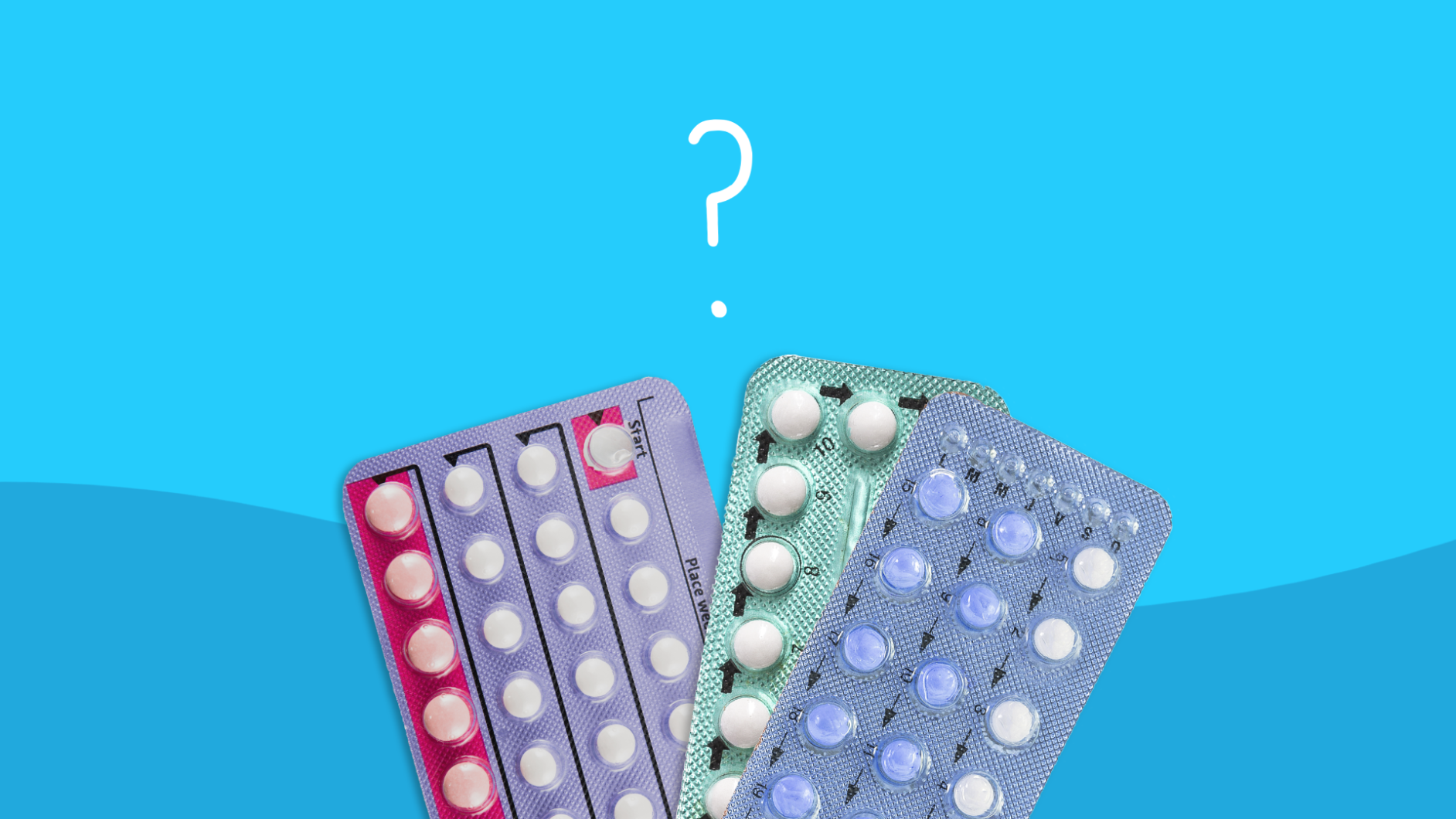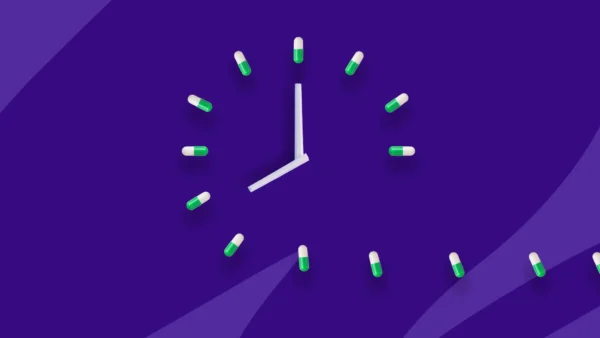If you’re trying to prevent pregnancy, you’re probably using some form of birth control, or contraception. Birth control is any medication, device, method, or surgical intervention that stops a pregnancy before it begins. There are many kinds—from condoms to oral contraceptives and vaginal rings.
If you’re on a hormonal form of birth control like the patch, ring, or the pill, it’s important to know that some medications can make your contraceptive less effective. And while most antibiotics won’t reduce the efficacy of hormonal birth control, there are two that will. Here’s what you need to know.
Can you take antibiotics and birth control?
Most antibiotics don’t affect birth control, says Kim Langdon, MD, OB-GYN and founder of Coologics. Rifadin (rifampin) and Mycobutin (rifabutin) have been shown to reduce the effectiveness of some hormonal contraceptives, but data on how much these antibiotics impact hormonal birth control efficacy is lacking and they are not as commonly prescribed as other options.
According to Erika Gray, Pharm.D., chief medical officer and co-founder of Toolbox Genomics, a DNA and epigenetic testing company, the following forms of hormonal birth control may be affected by rifampin, and to a lesser extent, rifabutin:
- Combined oral contraceptives, birth control pills that contain a combination of synthetic estrogen and progestin
- Progestin-only pills (minipill), oral contraceptives containing only synthetic progestin
- Plan B, an emergency contraceptive pill made of levonorgestrel that is taken within 72 hours of unprotected sex
- Contraceptive patches, contraception applied to the skin that releases estrogen and progestin
- Vaginal rings, flexible rings that are inserted into the vagina, releasing a combination of estrogen and progestin
- Ulipristal (Ella), an emergency contraceptive pill made of levonorgestrel that is taken within 120 hours of unprotected sex
These antibiotics do not affect how well other birth control options work, such as an intrauterine device (IUD), Depo Provera (progestin-only shot), hormonal implant, or barrier methods such as foam, condom, or diaphragm.
With perfect use, meaning you take the pill at the same time every day and never miss a dose, oral contraceptives are up to 99% effective, but because many users miss a pill from time to time, their rate of effectiveness with normal use is closer to 91%. Most antibiotics won’t affect birth control efficacy, so your chances of getting pregnant are the same as with normal use unless you’re taking rifampin or rifabutin, says Dr. Gray.
According to Planned Parenthood, having diarrhea or vomiting for more than 48 hours, or taking laxatives can reduce the effectiveness of birth control pills. A backup method of birth control such as a barrier method should be used for seven days to prevent pregnancy.
RELATED: What is the best birth control pill for you?
What the research says
A 2018 study found that the antibiotic rifampin (600 mg/day) reduced the effectiveness of birth control pills—as did rifabutin (300 mg/day); the drugs reduced levels of ethinyl estradiol (a synthetic estrogen) and norethindrone (a synthetic progesterone).
But according to Dr. Langdon, it’s unlikely you will get pregnant when on hormonal birth control if you’re taking antibiotics other than rifampin or rifabutin. In fact, according to a 2017 systematic review, no evidence of drug interactions between hormonal contraception and non-rifamycin antibiotics was found.
Rifampin
Rifadin (rifampin) treats the infectious diseases tuberculosis and meningitis. This antibiotic is known to interact with hormonal contraceptives, potentially reducing their effectiveness, says Dr. Gray. “Rifampin affects the way the body metabolizes hormones, specifically estrogen and progestin, which are the key components of most hormonal birth control methods,” she explains.
What’s more, Rifampin induces the activity of certain liver enzymes that are responsible for breaking down and eliminating hormones, adds Dr. Gray. When this occurs, the hormones in birth control are metabolized and eliminated from the body more quickly than usual, making them less effective and increasing the risk of unplanned pregnancy, she explains.
Rifabutin
Mycobutin (rifabutin) is used to treat tuberculosis, Mycobacterium avium complex disease (MAC), or H. pylori. Like rifampin, the antibiotic rifabutin may reduce the effectiveness of hormonal birth control because it can speed up the breakdown of hormones (estrogen and progestin) in the body by increasing the activity of liver enzymes, explains Dr. Gray. As a result, hormone levels in the blood might decrease, she explains.
What other medications affect birth control?
Some medications, like antifungals, can interact with hormonal birth control and potentially reduce its effectiveness, says Dr. Gray. Examples include:
- Anticonvulsants such as carbamazepine, oxcarbazepine, phenytoin, and topiramate
- Antifungal medications like griseofulvin, fluconazole, metronidazole, and itraconazole
- Antiretroviral medications for HIV such as ritonavir and efavirenz
- Herbal supplements including St. John’s Wort, vitamin C, and melatonin—although more research is needed
- The diabetes medication Actos (pioglitazone)
- General anesthesia such as Sugammadex
- The anti-nausea medication Emend (aprepitant)
- The pulmonary hypertension medication Tracleer (bosentan)
- NSAIDS like ibuprofen and naproxen
RELATED: 11 medications that interfere with birth control
Birth control and antibiotics FAQs
Can amoxicillin or other antibiotics affect birth control?
A Z-Pak, or azithromycin, is a broad-spectrum antibiotic that is commonly prescribed for various bacterial infections, says Dr. Gray. “There is no strong evidence suggesting that azithromycin significantly affects the effectiveness of hormonal birth control,” she says. In fact, that’s true for most types of antibiotics, including:
- Penicillins like amoxicillin and ampicillin
- Cephalosporins such as cephalexin and cefuroxime
- Macrolides including azithromycin and erythromycin
- Tetracyclines such as doxycycline and tetracycline
- Fluoroquinolones like ciprofloxacin and levofloxacin
Will Plan B or Ella work if I’m taking antibiotics?
Most antibiotics won’t affect Plan B or Ella (the morning-after pill), but rifampin is listed as a medication that will reduce its effectiveness. If you’re taking rifampin or any other medication, be sure to consult with your healthcare provider before taking Plan B or Ella.
How long after taking antibiotics does birth control work?
Most antibiotics do not significantly impact birth control, with the exception of rifampin and, to some extent, rifabutin, says Dr. Gray. If you’re on either of these medications short-term, discuss with your healthcare provider and use a backup form of birth control (a barrier method such as a condom) for the duration of your treatment and for seven days after you’ve finished to avoid an unintended pregnancy. For long-term treatment with rifampin or rifabutin, a backup form of birth control should be used during treatment and for two weeks after completing the course of antibiotics.











